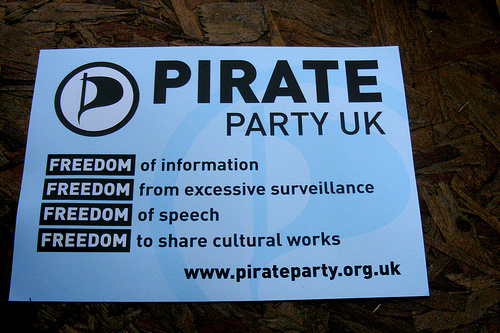Surprise surprise, the British Phonographic Industry (BPI) has, six months since the realisation of the UK Pirate Party's Pirate Bay Proxy service, requested that the party remove the service and block access to famous torrent search engine, The Pirate Bay.

tpb.pirateparty.org.uk is a proxy set-up by the Pirate Party providing direct web access to torrent search engine, The Pirate Bay, instigated briefly prior to court rulings that compelled various ISPs to block access to the site. The proxy provides a legal loophole for users of ISPs who have implemented the block, with the embargo itself not a country-wide requirement, holding a limited scope of enforcement. Loz Kaye, Pirate Party leader, released the following statement:
Late this afternoon I received an email from Geoff Taylor at the BPI indicating that a letter had been sent to the Pirate Party, as well as an electronic copy of that letter which refers to our provision of a Pirate Bay Proxy. We have not yet received the letter by post.
As this letter seems to have been made available to the press, I would like to make it clear that we will respond to the BPI by the 6th of December as requested by Mr Taylor, as well as informing our members of the letter, its contents and our response.
The Pirate Party UK has hosted a proxy (tpb.pirateparty.org.uk), allowing people to connect to the Pirate Bay via Pirate Party servers, since April 2012, a little before the Pirate Bay was blocked by some UK ISPs after being issued with court orders. These court orders remain in place and some ISPs continue to prevent access to the Pirate Bay.
As we stated in May 2012, we provided the proxy as a tool for users on networks where the Pirate Bay is blocked through filtering, we will continue to do so as long as this situation continues.
The proxy continues to be a legitimate route for those affected by court orders issued to some (but not all) UK ISPs requiring the site to be blocked. Whilst some providers continue to allow access to the web in an unfiltered manner, others are limiting access to specific parts of the internet.
Mr Kaye's statement highlights the fact that a block is not currently a national requirement, despite suggestive words from the BPI:
"Pirate Party UK's free speech arguments are a complete red herring. We are passionate believers in freedom of speech, but it doesn't justify The Pirate Bay helping themselves to other people's work. The human rights implications of blocking this illegal site have been fully considered by the High Court. Whatever their views, Pirate Party UK are no more above the law than anyone else."
We suspect that ultimately, this one will end-up in court, just as it did for many of the country's ISPs, though with the Pirate Party not an actual ISP itself, it could be that we see exiting blockades expanded to cover the party's link. The Pirate Party insists that the blocking of The Pirate Bay bypasses democratic process, whilst the BPI insists that prevention of copyright infringement should stand above the proliferation of an open service, a subject matter that will always be a controversial one.













